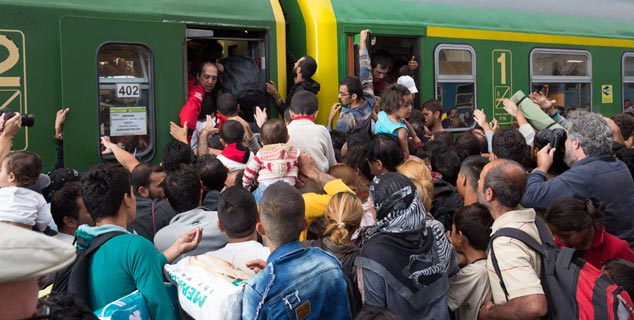
Only a few months ago everyone who was forecasting the end of the eurozone assumed that it would be economics that would bring it down.
We all know now that it isn’t possible for a group of disparate countries to have monetary union without fiscal union. It just doesn’t work. So if Europe’s countries don’t formally agree to a system of endless fiscal transfers such as those in the USA and the UK, the eurozone will eventually, inevitably break.
But it is beginning to look like it will be something else that ends Europe’s dream – its borders.
One of the major components of the dream is a borderless continent. Once inside the Schengen area, anyone in Europe should be able to go anywhere they like. There are no borders to trade and to capital, and in just the same way there are no borders to people. That’s not going to be the case for much longer.
Angela Merkel has already raised the possibility that borders might be closed: “if we do not succeed in fairly distributing refugees”, she said earlier in the week, “then of course the Schengen question will be on the agenda for many”. Theresa May said much the same. Our system is broken, the Sunday Times reported her as saying – and that’s been a problem that has been hugely “exacerbated by” Schengen.
Look around and you can already see the reaction. There is populism and hysteria, of course, but there is action too. Austria is doing close checks on cars and trains coming from Hungary. Italy is temporarily restoring controls at the Austrian border. The French are stepping up checks around the Italian border. The Danes are keeping a closer eye on their German border.
This is important – much more important to the European project than Greece and its bonkers debt ever was. The best thing to read on this right now is James Fergusson in last week’s Independent on Sunday. Pay attention holidaymakers, he says, “what is now happening on the EU’s external borders threatens the entire post-war European project.”
The figures here “sound biblical”: there are more refugees on the move around Europe than at any time since the Second World War, with every sign that there are many more to come. Yet “we still have no common European asylum policy, nor even a basic strategy – no clue at all, in fact, about what to do.”
This has paralysed our leaders and, so far, made it abundantly clear that Europe is nowhere near being one state. It is instead a loose grouping of competing nations facing “the queasy feeling that the magnitude of this crisis could be beyond our organisational capacity to cope.”
And even if we were able to better share the burden of asylum seekers in Europe, we would only buy ourselves time. This, says Fergusson, is no passing storm: “we are in the grip of forces that have already accelerated beyond our control.” The refugees coming our way are running from Islamic extremism, but also from poverty, hunger and, in particular, thirst.
Let’s not forget that the Arab Spring revolutions in both Syria and Yemen were sparked by disputes over the misallocation of water. “The poor, dry south is moving to the rich, wet north simply in order to survive.”
That’s not changing. The migrants will keep coming. Europe will find it impossible to cope. Local populations will demand closed borders. Borders will close. Schengen will be finished. And without free movement of people, the whole idea of the European Union is in some serious trouble.
Makes the bickering about whether we admit that Greece is in default or not look like a sideshow doesn’t it?